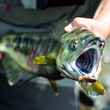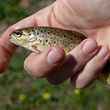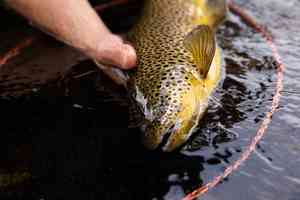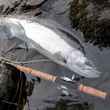Years ago, while fishing a giant flat in the backcountry of Long Island in the Bahamas, I came across my first “mud” — a busy conglomeration of jacks, snappers and barracudas, and a few bonefish — engaged in a mass of moving fish. SIlvery scales caught rays of sunshine and flashed them back into the heavens as they fed on a ball of bait. The larger fish, like the ‘cudas, were chasing the smaller fish that were probably chasing something even smaller, like bunker or shad.
Armed with a wire leader and a foam popper, I had more fun catching jacks and toothy barracudas for a solid hour than I’d had stalking and casting to big Bahamian bonefish the entire day leading up to this “event.” It was a blast.
Then, some years later, on a guided, boat-bound trip, also to one of the family islands in the Bahamas, I and my guide came up on something that looked a lot like that first mud — a busy mishmash of fish engaged in a circular dance of life and death. But there was an added ingredient in this mud that made me a bit apprehensive.
Sharks. And not just a few sharks. A lot of sharks. A dozen or more. We’d seen them as we pulled onto the flat, patrolling the edges of the mangrove, not far from where we’d come upon this mass of fish. Some of the nurse sharks and black-tip sharks we’d seen in the group were sizable — we’d guessed that a few pushed eight feet, which might have been a modest estimate. They lingered on edges of the flat, a couple hundred yards or so from where our boat was perched on the edge of the mass of mudding fish, and we worried that if we pushed a jack or a snapper — or even an unwary barracuda — out of the protective sphere offered by the sheer numbers of fish, one of the sharks might give chase.
With our guide on the polling platform, I and my fishing partner, a great guy I’d been paired with at the lodge, grabbed our 8-weight “‘cuda rods” armed with wire leaders and started throwing poppers into the school. It only took a few casts to interest a barracuda, and then my friend hooked into a nice 8-pound jack. The take, of course, was the visual payoff of a cast into the midst of the fracas. The fight was typical saltwater craziness — long runs, backing knots slipping through tip-tops, the whole thing.
But the most heart-stopping moment of this encounter with this sheer mass of saltwater mayhem involved neither a jack nor a barracuda. Amidst our hooting and hollering, one of the sharks must have crept up on the boat, despite our periodic over-the-shoulder checks to make sure the pin-eyed predators were minding their own business on the edge of the flat. And I’ll say this, when a six-foot-long nurse shark blows up on a popper meant for a feisty jack and takes off for deeper water, if your heart isn’t pounding out of your chest, there’s something wrong with you. It’s the compact version of Roy Scheider tossing a bucket full of chum into the mouth of a waiting great white. The teeth. The aggressiveness. And, honestly, that tinge of terror. It’s unreal.
First, an important disclaimer: it’s not legal to intentionally fish for sharks in the Bahamas — the island nation outlawed the practice in 2011 to protect all sharks in its waters amid the shark-fin soup craze. The nation’s fisheries professionals recognized that sharks in the Bahamas have an important economic role to play, so long as they are left to swim among the flats, the reefs and the wrecks of the crystal-clear caribbean. Divers contribute a significant amount to the Bahamian economy — about $114 million dollars in 2017— and seeing an interacting with generally harmless reef sharks is what makes the diving engine hum. The dive industry in the Bahamas is the largest in the world.
When it happens, you really don’t have time to process the event. One second, you’re skipping a popper over a school of mudding jacks, and the next you’re watching your backing knot fly through the tip-top of your fly rod wondering what the hell is going on.
“Now what are you going to do?” my fishing partner asked me.
“I have no idea,” I said. “I didn’t plan for this.” I looked at the guide, who kind of gave me a shrug.
“We gotta go after it,” I said, “or I’m gonna lose this whole damn rig!”
Truth be told, anyone willing to toss a popper over a school of fish when big sharks are anywhere nearby, we learned, (with an 8-weight rig, mind you) better be prepared for such an encounter. The good news is, after chasing the big fish down, the shark politely spit the hook and returned to the school of mudding flats fish. No harm done. Except maybe to my blood pressure.
Fisheries and tourism officials in the Bahamas are absolutely right to promote these big predators as visual attractions. While I do love to fish for bonefish and permit on the flats, I also really enjoy getting the chance to watch sharks hunting among the mangroves and the beach cuts.
Judging by the numbers of sharks on recent trips to the Bahamas, it’s clear the country’s ban on shark fishing is working. And that’s a good thing for the environment and for the overall health of the country’s fisheries.
And no, the poppers aren’t all about fishing for frenzied flats fish as they work over a baitball in the middle of nowhere. They are great fly patterns for hungry barracudas, jacks and mutton snapper that swim in the backwater creeks and mangroves drains on the flats — taking a quiet skiff ride into the “backcountry” can be the perfect set-up for casting big, gaudy poppers against the mangroves and watching hungry fish erupt beneath them.
You’ll need a foot or so of light wire leader to ensure the toothy ‘cudas don’t slice your line, and that 8-weight is just about right for casting flies into tight quarters amid the mangroves. It’s one of the lesser-discussed “disciplines” of fishing the tropics. We come for the bones and the permit and the endless days spent “hunting” for fish, and sometimes we end up just as happy standing on the casting platform looking for a barracuda to tempt with a topwater fly. There’s just something really cool about a fish with such a big, toothy smile.
But, remember the old adage about messing with the bull and the likelihood of getting the horns in return? That’s applicable to sharks in saltwater, too. If you throw poppers near sharks patrolling a school of jacks, you may get more than you bargained for.
Before you do it, ask yourself if you’re willing to blow up your rig.































Comments